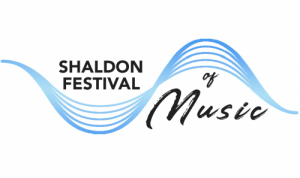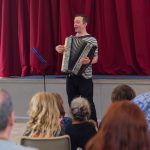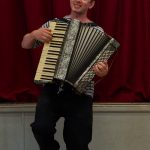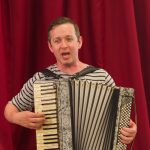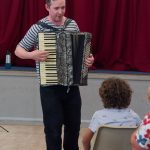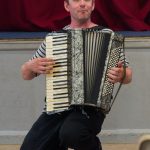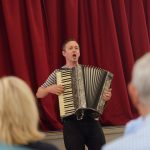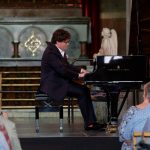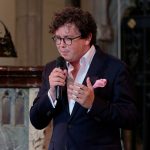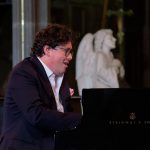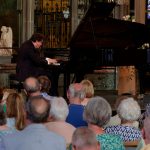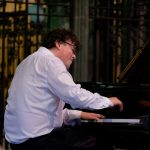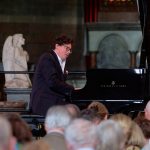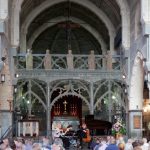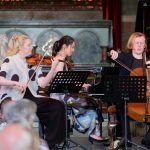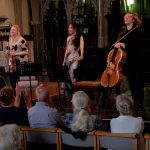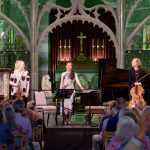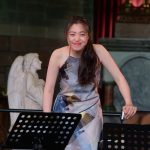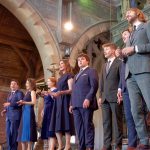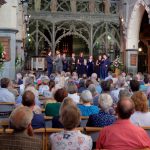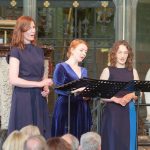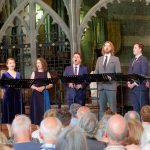Shaldon Festival 2025
Scroll the page or click on the performer’s name for photos and reviews for 2025.
Review of Alistair Sutherland’s children’s concert on Sunday 15th June
Alistair performed at our free family concert in the Victoria Hall. It was a beautiful sunny day so – given they could have been on the beach – it was a testament to the attraction of sea shanties that the hall was so full of excited youngsters who really got into the swing of things.
Alastair gave us a vibrant, interactive performance, involving the children and the adults in equal measure and his love of the genre was reflected in the depth of his knowledge about sea shanty history.
This concert was part of our outreach activities through which the Festival is proud to give something back to our local community.
Review of Martin James Bartlett’s concert on Saturday 21st June
Martin James Bartlett has had a meteoric rise to international fame since leaving school just over a decade ago, with global tours, three award-winning albums, and a constant stream of prize-winning performances. On Saturday night, in the final concert of the 2025 Shaldon Festival of Music, the audience were treated to a show of virtuosity that revealed the extraordinary abilities and passion of the young man behind the success. The evening contained everything from pathos and gentle imagery to fireworks and thunderstorms, all in a flawless performance.
Arriving on stage with a broad, beaming smile, he immediately engaged with the audience, explaining that he would like to talk a little about the music he was to play. The warmth of his charm and his natural enthusiasm were irresistible: this was going to be fun!
His first two pieces: JS Bach’s ‘Prelude in B Minor,’ arranged by Alexander Siloti and Gluck’s ‘Melodie’ from ‘Orfeo ed Euridice,’ arranged by Giovanni Sgambati, were both gentle, sensitive and calming: perfect for everyone to become accustomed to the sound and atmosphere in this warm solstice evening.
He was clearly delighted, and even slightly embarrassed, by the duration and energy of the applause with which each piece was met, the warmth of his charm growing all the while.
Then came Schubert: the ‘4 Impromptus, (Op. 90, D.899).’ Bartlett explained that the pieces always lifted him from any level of solemnity and it was easy to see why. He took us from gentle harmonies and perfect cadences, to the evening’s first example of breath-taking, high speed dexterity. These pieces have been described as playing “on a knife edge.” He managed to balance them perfectly, steering our attention through the complexity to enjoy the beauty of the themes. At the beginning of this quartet of pieces, all was still calm. By the end, the performer and the audience were well and truly warned up.
For the last piece before the interval, we had Schumann’s song, ‘Widmung’ as arranged for the piano by Liszt. The arrangement maintained the lyrical nature of Schumann’s love song to his wife, Bartlett carefully managing the modest contract between two voices – dark and light – to express the emotion. The occasional forays into musical decoration in the higher register were never allowed to distract from the central melody, making its way elsewhere on the keyboard. He brought out some of the theme’s interesting reminders of much more modern love songs within Schumann’s tune, reminding us of just how timeless such music is.
The second half began calmly, once again, with Ravel’s exquisite ‘Pavane pour une infante défunte,’ our enjoyment being greatly enhanced by Bartlett’s explanation of the background to the piece. His playing was as sublime as ever and the audience was once again taken to places of reverie.
To follow was the equally delightful ‘Arabesque No. 1 in E minor’ by Debussy. Once again the performer’s description beforehand, melding balletic movements with images of gentle Arabic arches, was a wonderful complement. The cascades and suspended cadences were smooth and inviting, the rendition beautiful.
Bartlett then explained that we would be moving on from the gentle material. His next piece, Wagner’s ‘Liebestod’ from ‘Tristan and Isolde,’ arranged for piano by Liszt, certainly changed the mood.
For a Wagnerian, this piece can be problematic given that the climax in the original opera is one of the most emotional moments in Wagner’s canon. When heard on a recording, the more dramatic, fortissimo passages towards the end can be unconvincing. Bartlett’s concert rendition, however, made the manner in which Liszt sought to replace the orchestra, and operatic soprano, make perfect sense. A lively and powerful piece, the pianist managing to combine the drama of the moment with the essential pathos of Isolde’s agony.
By this time, the audience would have followed Bartlett anywhere, which was fortunate because the final piece would require a great deal of engagement on their part. Ravel’s ‘La Valse,’ the title track on Bartlett’s 2024 album, is one of the most difficult pieces in the entire piano repertoire; as such, it is rarely performed.
This was astonishing. Surely one of the most remarkable piano performances ever at Shaldon Festival.
The extraordinary “choreographed poem” was described by the musicologist Paul Landormy as having “unexpected depths of romanticism, power, vigour, and rapture.” Having begun on the piano, it was built into a full orchestra piece and a ballet, transcribed (by the composer) for two pianos, and then for one instrument. (There is also a transcription for four hands.)
Ravel’s ‘impressionist’ style is not usually associated with the storm and stress of ‘Sturm und Drang’ but the subject addressed in this piece (the collapse of society in war) would appear to justify such a connection. Certainly Bartlett’s performance did. At the end (of nearly twelve minutes of musical and physical pyrotechnics) Bartlett leapt from the piano stool, his smile still a mile wide, and the audience was on its feet.
Having (almost) caught his breath off-stage, the applause continued unabated while he took several bows. By request, as a way of calming everything a little, he gave us Gershwin’s ‘Embraceable You’ in an arrangement by Earl Wild, as his encore.
The much-loved, great pianist Alfred Brendel, who died in the week of the concert, used to say that technical brilliance on the piano was not enough and that perfection required a balance between intellectual discipline and emotional depth, in order to reveal the true essence of the music: something more than flawless playing.
Bartlett gave us so much more.
Richard Lamming
Review of the Paddington Trio’s concert on Friday 20th June
There is always something special about seeing highly talented musicians at an early stage in their professional development, bringing as they do a beguiling freshness, energy and inventiveness to their performances. Winner of the prestigious international Parkhouse Award in 2023, in just a few short years The Paddington Trio -Tuulia Hero, violin; Patrick Moriarty, cello; and Stephanie Tang, piano – has drawn accolades from across the musical spectrum. “Their youth does not remotely detract from their excellence – these are accomplished musicians by any standard, not only in technique but in rapport and nuance.”(from Strings Attached). One notable innovation in their programming for Shaldon Festival, was the inversion of the normal pattern of moving from earliest composed work to most recent. Choosing to focus on the composers’ first listed Piano Trios in each case, they began with Shostakovich’s Piano Trio No. 1 in C minor, followed by Robert Schumann’s Piano Trio No.1 in D minor and concluding with Schubert’s Piano Trio No. 1 in B flat major. This order of performance threw fresh light on the long and distinguished tradition of trio composition, showing how later composers build on earlier approaches to the form in their own unique ways.
From the first bar of the Shostakovich, impeccably timed and phrased, we knew we were in for a special evening. The rapport between the three musicians was remarkable, each listening and responding to their fellow players with an intense yet relaxed focus. No grandstanding here – it was the interpretation of the work as a whole that each player was dedicated to. It was their emotional maturity that most shone through, whether expressing the intense romanticism of the Schumann, or the gorgeously long “singing” phrases in the Schubert. At the start of the second half, pianist Stephnie Tang took the microphone to pay a heart-warming and fulsome tribute to both her and the trio’s mentor, Afred Brendel. Largely self-taught, Brendel was among the very finest pianists of his generation and a selfless (and humorous!) supporter of young musicians. He died just three days earlier than the trio’s Shaldon recital, on 17th June, aged 94. The trio’s final performance, the Schubert, was dedicated to Brendel’s memory and had a unique emotional intensity that will live long in the memories of those of us fortunate enough to hear it.
Roger Kirk
Review of VOCES8’s concert on Thursday 19th June
So this was my dilemma – to attend the VOCES8 concert or to listen to my son – DJ Nicky Roule, -simultaneously broadcasting ‘live’ on BBC Radio…
As former MD and Conductor of the Shaldon Singers – I know where my priorities lie… VOCES8 were absolutely beyond brilliant!
A wonderfully inspiring afternoon workshop for local School Students prior to their evening performance, brought out some glorious participation amongst these youngsters which, I’m sure they will all fondly remember. Focussing on an intricate arrangement of Kate Rushby’s ‘Underneath the Stars’ arr. Jim Clements, the Students’ combined performance with VOCES8, at the end of the workshop, was transformed by tips on breathing and listening to each other. Thanks Barnaby for gently introducing concepts such as contrapuntalism and antiphony to them. This was Musical Education at its very practical yet totally intuitive best! Singing is the best way into so many life-long musical experiences and long-lasting beneficial social interactivity.
From Orlando Gibbons, Di Lasso, Elgar, Gershwin and Paul Simon, we were treated to such unbelievably accurate and incredibly moving insights into our greatest repertoire via completely unaccompanied, or ‘A Cappella’ singing.
The spell-binding subliminal communication between the singers brings about such effortless musical nuance and detail, with total unanimity of purpose, seemingly with no visible ‘direction’ – as if they were singing as one single voice. They even took in to account the moderate acoustic of St Peter’s Church, thus elongating the cadences, decrescendos and gentle sibilant endings – Wow!!
The more Jazzy numbers were choreographed beautifully with just the right amount of a ‘nod’ to the humour of the text. The most intricate of ‘close chordal clusters’ supporting many of these numbers were breath-taking, and astoundingly accurate in all aspects of pitch, rhythm and dynamics.
To hear the slight twang of an American accent in Don McLean’s ‘Vincent’, Paul Simon’s ‘Sound of Silence’; and to experience quintessential Englishness in ‘Lux Aeterna’ from Elgar’s ‘Nimrod’, we were truly transported both musically and geographically.
VOCES8 were literally to be transported by air the morning after our Shaldon Festival Concert to Slovenia for another concert in their very busy schedule. Congratulations and a very fond farewell to Andrea after 17 years – I will never again listen to an Allegri Miserere’s top C without thinking of her!
As an encore – following a unanimous ‘standing ovation’ – VOCES8 sang a ‘flighty’ little arrangement combining two of Frank Sinatra’s moderately(!) famous songs – ‘Come Fly With Me’ and ‘Fly Me To The Moon’.
Bon Voyage, have a good flight – and thank you all so much for such a fabulous evening!
(P.S. My son’s BBC Radio broadcast was repeated on the following Saturday!!)
Nigel Crabtree
